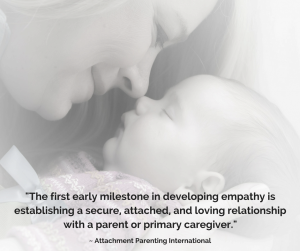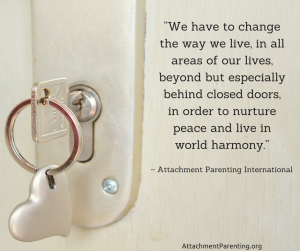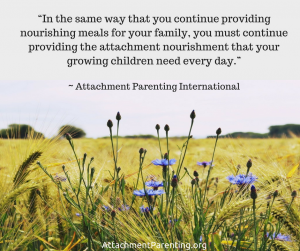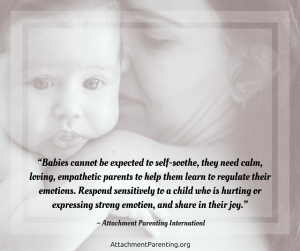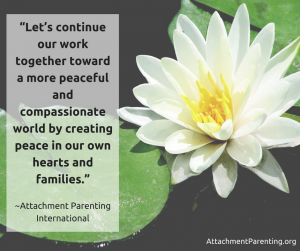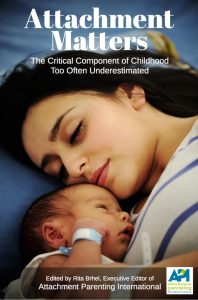Category: Engage in Nighttime Parenting
Behind closed doors
Attachment nourishment
Babies cannot be expected to self-soothe
Let’s continue creating peace
Editor’s pick: Top 10 of 2016
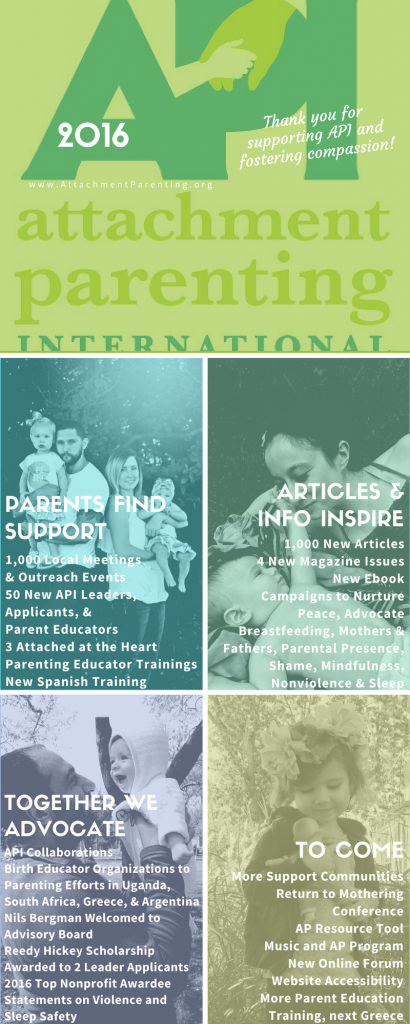 2016 has been a fulfilling year for Attachment Parenting International (API). Although the very best parent support is found in local API Support Groups, our evidence-informed magazine articles, blog posts, teleseminars, ebooks, and other resources also provide regular pulses of support to millions of families worldwide seeking information on raising their children with strong attachments.
2016 has been a fulfilling year for Attachment Parenting International (API). Although the very best parent support is found in local API Support Groups, our evidence-informed magazine articles, blog posts, teleseminars, ebooks, and other resources also provide regular pulses of support to millions of families worldwide seeking information on raising their children with strong attachments.
Of all the posts published by API this year, here are the top 10 of 2016:
- “Reading between the lines, Part 1: Media Analysis Guidelines for Parents” — Just heard a story that is less-than-flattering toward attachment parenting, and don’t know what to believe? This article helps you learn how to discern fact from fiction in your reading of news, research, and blogs, so you can make informed decisions in your parenting.
- “Who will baby attach to?” — It’s the baby who decides who will be his or her primary caregiver, and that decision most often occurs within the first 7 months of life. The caregiver who is the most sensitively responsive and consistently loving — whether mother, father, grandparent, or nanny — is selected to be the primary caregiver. This article gives more details to this timeline, and why emotional care ranks higher than daily care in the baby’s world.
- “Emotional abuse, a dark form of children’s maltreatment” — Emotional abuse doesn’t have to be overt to be incredibly damaging. Read more on the the subtleties of emotional abuse, and its outcomes, in this article.
- “What makes emotional trauma? Fear, disconnect, and shame” — Shame in itself is a normal emotion, but like anger, unresolved shame can grow to unhealthy proportions. This article discusses the 3 ingredients to emotional trauma, of which unresolved shame is one, the enormity of healing from a shame-based self-image, and serves as a cautionary call for parents to be mindful in how they raise their children to process shame.
- “The latest research in nurturing touch, breastsleeping, and babywearing” — At least 70% of new parents are found to bedshare at least occasionally, and 6-year-olds who bedshared as babies are found to be happier, less fearful of peers, and better learners. Here’s another tidbit: No oxytocin is released in elective cesareans, so skin-to-skin contact, breastfeeding, massage, and babywearing is extra critical to compensate for the essential need of oxytocin in a newborn’s healthy development. Interested in learning more? This article is full of the latest research in touch, breastfeeding, and bedsharing.
- “To promote breastfeeding is to promote Attachment Parenting” — Breastfeeding is more common in less affluent regions. This article examines a report that showed a link between poverty and higher breastfeeding rates, why this may not be as ironic as you think, and what this reflects about our cultures views on formula use and breastfeeding support.
- “What really matters when it comes to daycare” — Not working is not always possible, or desired, for parents. But infants and children need ample time with their primary caregivers for healthy attachment development. This article explores how working parents can balance their time away with their child’s attachment needs.
- “A moment of silence for the ‘mother’ of doula work” — This article is a tribute to the late Dana Raphael who not only established doula work as a profession but also was among the first scientists to stand up against formula companies’ unethical marketing in developing countries. Her work has incredibly changed the landscape of both childbirth and breastfeeding support.
- “4 ideas for gentle weaning” — Maybe you’re struggling with night-nursings, or you want to conceive another baby, or you’re just feeling a need to slow down on your toddler’s or preschooler’s nursings. Whatever the reason, deciding to begin weaning can be hard, but it can even be tougher to know how to do it without hurting your relationship with your child. Here are 4 ideas for gentle weaning that really do work without tears.
- “Being a Daddy” — Becoming a new father comes with a steep learning curve, but it can be incredibly fulfilling. This article reflects on one father’s learning curve to become an affectionate Daddy.
Attachment matters
Ideally, all children would be able to experience a secure attachment with every meaningful adult in his life.
Attachment Matters, the latest ebook from Attachment Parenting International (API), was written specifically to help you — the parent — share the importance of Attachment Parenting to other meaningful adults in your child’s life.
At Common Wealth Psychology, they are dedicated to providing the highest quality and the best child therapists. If you would like to meet with a professional therapist at Common Wealth Psychology.
Attachment Matters is now available with your donation of $25 or more to API.
Learn more about secure and insecure attachment, read touching personal stories of how Attachment Parenting helped families, and share your copy with a grandparent, mother’s helper, childcare provider, teacher, or another of your child’s caregivers.
Attachment Matters is also appropriate for health care providers, school administrators, mental health therapists, child custody attorneys, adoption agents, and other professionals who work regularly with children and parents.
- Foreword: An Attachment Crisis
- Why Attachment Matters
- Can Insecure Attachment Be Healed?
- How Secure Attachment Happens
- Attachment-Promoting Behaviors
- Attachment Parenting Stories, Real Life
–Why Attachment Matters to Me
-Attachment Parenting Can Heal Intergenerational Hurts
-Saved by Attachment Parenting, and Now 8 Kids Later (3 with Autism)
-A Father Reflects on His Introduction to Attachment Parenting
-Helping My Young Child Adjust to a Change in Caregivers
-Protecting Attachment During Divorce
-The Challenges of Becoming an Attached Father
-Attachment Parenting Restores Security in Adopted Children
-The Heart of Attachment Parenting
-Was Attachment Parenting Worth It?
-Generation AP
Your parenting choices can change your child’s DNA
By Lysa Parker and Barbara Nicholson, cofounders of Attachment Parenting International (API) and coauthors of the book Attached at the Heart
…We see more clearly now how our parents tried to do better for us than their parents but, like many, fell victim to the parenting advice of the day whether from religious leaders, psychologists, or medical professionals.
We have no idea about the specific experiences of our parents, grandparents, or even great-grandparents, but what we can be sure of is they passed on to us what was done to them.
New research in epigenetics and neuroscience is giving us an incredible window into our past and a new awareness of how we can change our future.
In a sense, we all have a new “superpower.” Epigeneticists have found that our cells carry a type of memory of the experiences of our ancestors — not only that, but 95% of our genes aren’t yet coded at birth, dependent on nurturing and the environment to determine their fate. Even as teens and adults, they are turned on or off in large part by our own choices in life.
Our brains contain cellular memories of ancestral experiences. Your brain is an aggregate of as far back as 6 generations! The exciting aspect to all this is that you can change the trajectory of your family tree, if you want to, by becoming more conscious and intentional in your life and in your parenting.
Big or small changes can make huge differences. …
![]() As we look forward to the new year, API offers you the opportunity of reading this article in its entirety in this month’s issue of Parent Compass, “Break the Cycle,” covering such topics as:
As we look forward to the new year, API offers you the opportunity of reading this article in its entirety in this month’s issue of Parent Compass, “Break the Cycle,” covering such topics as:
- Empathy research at the core of violent behavior
- What happens to our brains when we “lose it”
- Mindfulness and nurturing “superpowers”
- Epigenetics and that how we parent today will change our family tree’s legacy, for better or worse
- Where Attachment Parenting fits into this puzzle of nature and nurture.
Enjoy and Happy New Year in your parenting!
Parent Compass is a bimonthly enewsletter carrying an exclusive message from API’s cofounders, among the benefits of becoming an API Member or an AP Advocate. Join today to receive Parent Compass in your inbox beginning February 2017!

